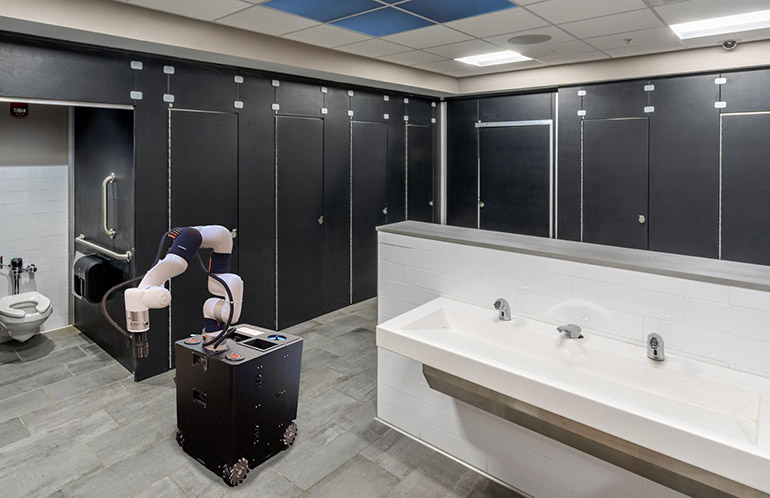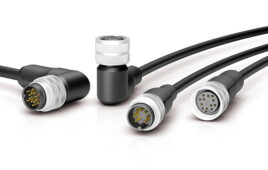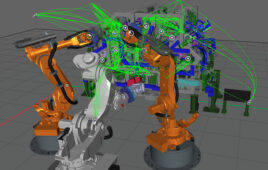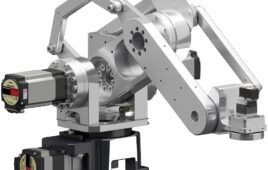|
Listen to this article
|

HiveBotics used MoveIt Pro to develop the Abluo bathroom-cleaning mobile manipulator. Source: PickNik Robotics
PickNik Inc. today launched MoveIt Pro Release 6, the latest version of its platform for developing robotic arm applications that were previously not possible or economically feasible.
“The intelligent decisioning capabilities of MoveIt Pro, including real-time object identification, force control, motion planning, and multi-step processing, opens up a vast new set of opportunities.” stated Dave Coleman, founder and chief product officer of PickNik Robotics. “Additionally, with MoveIt Pro’s rapid development platform, we can reduce development costs by 75%, even for the most complex robotic applications.”
Founded in 2015 for the Amazon Picking Challenge, PickNik Robotics has developed software to help organizations improve precision and efficiency in industries ranging from aerospace to construction and logistics. The Boulder, Colo.-based company is also active in the open-source Robot Operating System (ROS) community.
“Our algorithms are fundamental across lots of different industries, and MoveIt Pro can save companies from having to build applications from scratch,” Coleman told The Robot Report. He will speak about the top reasons why robotics companies fail at RoboBusiness, which will be on Oct. 16 and 17 in Santa Clara, Calif.
“The majority of robotics companies come out of grad schools,” said Coleman. “I know the robotics side, which is why we brought Dave Grant in as CEO.”
MoveIt Pro 6 designed to help robots be more adaptable
Robots have historically been constrained by limited flexibility, as well as the need for pre-planned movements and highly structured environments, noted PickNik Robotics. This limited them to simple, repetitive tasks, and reprogramming required significant cost and effort.
The company claimed that MoveIt Pro “shatters these limitations” with new features:
- Real-time object recognition: This empowers robots to make intelligent choices and adapt to unexpected obstacles, said PickNik.
- Dynamic path planning: MoveIt now enables the identification of optimal paths on the fly.
- Force-compliant and IO controllers: These allow robots to handle objects of varying sizes and weights with precision. MoveIt Pro 6 also supports whole-body control for mobile manipulators.
In addition, MoveIt Pro 6 includes intelligent runtime decisioning, which facilitates multi-step operations and allows robots to overcome unexpected obstacles or environmental changes. It can handle variations in object size, weight, or orientation, as well as pose and visualization for new and enhanced behaviors.
PickNik Robotics touted MoveIt’s hardware-agnostic design. Its Pro RRTConnect joint-space planner and improved configuration parser support a range of off-the-shelf robot arms, end effectors, cameras, and other hardware components to reduce project costs. MoveIt Pro 6 comes with additional documentation and an updated user interface.
In addition, MoveIt Pro 6 includes debugging tools to further reduce development and deployment times, asserted the company. It also includes a physics-based simulation engine including RGBD cameras, 2D and 3D lidar, force-torque sensors, and vacuum or magnetic grippers for rapid prototyping of welding or nailing systems.
“MoveIt Pro 6 moves away from Gazebo for simulation and digital twins, taking a cue from the videogame industry,” Coleman noted. PickNik won a 2023 RBR50 Innovation Award for MoveIt Studio, the predecessor to MoveIt Pro.
“MoveIt Pro Release 6 is not just a software update; it’s a catalyst for innovation across industries,” added Dave Grant, CEO of PickNik. “We’re enabling our clients to automate processes that were previously not possible, from adaptive manufacturing to agriculture and beyond. Clients are only limited by their imaginations.”
HiveBotics halves development time with PickNik
“My engineering journey started when I was looking at a lot of open-source materials,” said Rishab Patwari, CEO of HiveBotics Pte. Ltd., which is developing the Abluo cleaning robot. “PickNik had written a lot of the guides and understood different motion planners. I had no advisers or money in the beginning, so I leaned on documentation.”
“MoveIt took care of the infrastructure for controlling a robot arm so we could focus on what we wanted to do — developing systems to clean,” he recalled. “I really like that it’s hardware-agnostic. We had used many different arms, and it was painful to learn each arm’s programming.”
Not only did PickNik provide packages for perception, planning, and obstacle detection, but it also offered consulting and co-development services, said Patwari. MoveIt provided layers of abstraction so that Singapore-based HiveBotics did not have to spend as much time and effort on things such as iterative closest point (ICP) perception, manipulation, and waypoint inspection, he explained.
For example, HiveBotics used MoveIt to develop a computer vision segmentation model for parts of a toilet bowl that generates how Abluo’s arm can move in real time.
“These things are complex and became core to our capabilities to provide a good experience for customers,” Patwari said. “PickNik’s infrastructure let us focus on how to clean, a strong value-add. We hope to deploy the Abluo restroom-cleaning robot by December, and thanks to MoveIt, it took one year rather than two years to develop.”
HiveBotics is looking to apply its experience and artificial intelligence to other workflows, including cleaning aircraft and addressing plan-and-scan requests in construction.
“HiveBotics’ team has done a lot of the work upfront, and I think mobile manipulation is easier to deploy than fixed automation, which needs to be calibrated,” observed Coleman. “With a mobile base, if the robot can’t reach something, it can just move, which allows for more rapid deployment.”
MoveIt Pro 6 reflects PickNik’s approach to offering core capabilities. Early on, the company provided engineering consulting for custom systems with multimillion-dollar price tags, Coleman said. Now, customers can reduce costs and risk and scale more easily, he said.
“We see our clients bifurcate — there are those like HiveBotics that are focused on business opportunity and time to market,” said Grant. “Other companies see themselves in the business of providing services, such as cleaning in meat-processing plants.”
“Some robotics companies are trying to become software companies,” he added. “Another customer in the residential home-construction business plans to use MoveIt Pro’s hardware-agnostic, intelligent decisioning to enable robots to pick up existing tools. We’re looking to partner with innovators across key markets, such as automotive assembly.”







Tell Us What You Think!